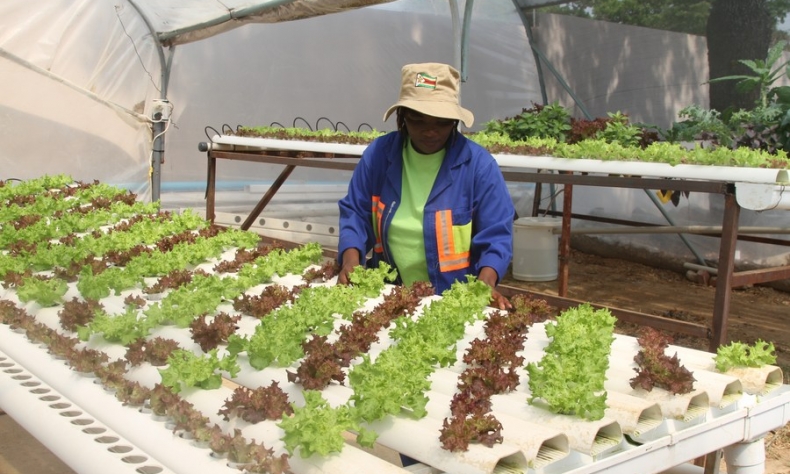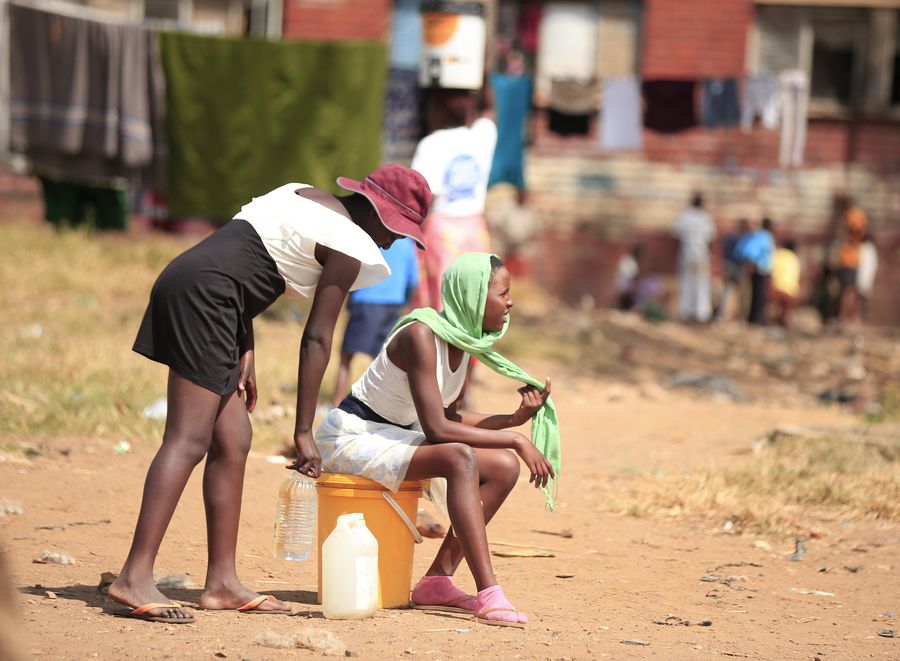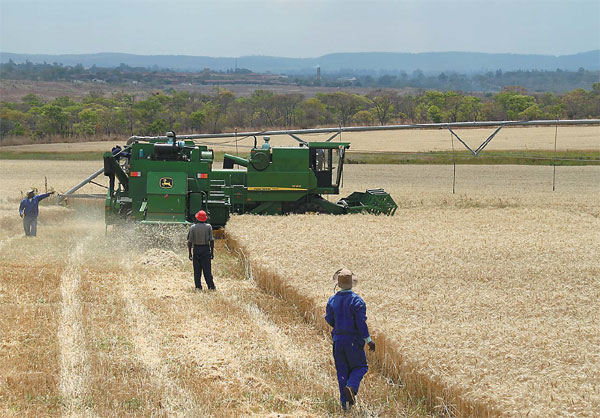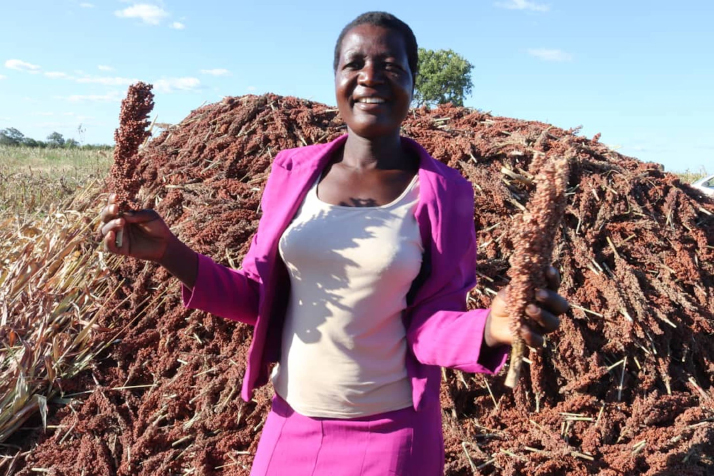Zimbabwe’s Agricultural Sector Boosted by China-Assisted Training

‘I was one of the first woman from Chiredzi to be selected for this program and getting trained was the best decision I have ever made.’
Dry streams filled with sand, and sun-baked soil and drought resistant mopane trees characterize vast expanse of land in the rural Chiredzi District, more than 600 km southeast of Zimbabwe’s capital Harare.
Topless and barefooted children make a beeline waving at modern non-governmental organization vehicles which frequent the district.
The vehicles are a symbol of hope to this marginalized community as they often bring food aid.
Children seldom complete their schooling. Boys are socialized to cross into neighboring South Africa and Mozambique to search for greener pastures in form of menial jobs, while girls are raised to be good wives who are submissive to their husbands.

Hope amidst gloom
However, amid gloom and despondency, some villagers’ lives have been transformed into beacons of hope.
Hailing from this district is Clever Dumela, who never envisaged that his life would change for good.
Dumela was one of the people selected to attend a three-month course on resilience knowledge, which included fish farming and small grain farming at Gwebi Technical College in 2016. This was made possible by Chinese company Debont Corp. through China-Aid Agricultural Technology Demonstration Center (CATDC), along with the support of the Zimbabwe Resilience Building Fund, which is worth $100 million.
The course takes place at the CATDC situated at Gwebi Technical College, about 27 km from Zimbabwe’s capital Harare.
CATDC is composed of an agricultural production and training base where it merges research, production, education and work, and a community.
The center employs more than 70 people and carries out research on small grains and fisheries, and provides technical training and promotion of sustainable development. More than 600 farmers have been trained at the center.
The Zimbabwe Resilience Building Fund is a long-term development initiative with an overall objective to cushion society from the recurrent shocks and stress caused by natural disasters and other unforeseen occurrences.
The fund is supported by the Ministry of Lands, Agriculture, Fisheries, Water and Rural Resettlement of Zimbabwe, the European Union, UNDP, among other stakeholders. The program being implemented in Chiredzi and Mwenezi districts is funded with $9.7 million.
“I was hesitant. I never had formal education in my entire life. Imagine setting foot in a college when you are already in your 40s – but I really wanted to gain knowledge on fish farming,” said Dumela.
He said the three months that he spent at the demonstration center have transformed his life forever.
Lacking school education, but driven by ambition and focus, Dumela’s light continues to shine brightest among his peers.

Program beneficiaries
The financial prowess and eye for investment of the 47-year-old farmer is the pride of the area.
With fish ponds, sugar cane plantations, horticulture, poultry and livestock projects, Dumela’s homestead resembles a mini industry that is being put to maximum use.
“I don’t throw away any waste or by-products, everything here is useful,” said Dumela, “That is the beauty of having resilient knowledge.”
With an estimated 100,000 fish in his pond, the father of five said the support he has been getting from the resilience building fund transformed his life and the knowledge he got from Gwebi Technical College helped him upgrade his fish pond.
“Thanks to them. Now looking at my pond with the fish inside, I am expecting to get over $250,000, which is a lot of money,” he said.
The farmer said that the knowledge he now has helped him transform his 3.5 hectares of land to a self-sustaining venture.
“I don’t buy fertilizers; I use water from the fish pond for drip irrigation. The water contains all the nutrients. I process leftovers from my harvest into animal feeds, so everything here is put to good use. Cow dung is fed into bio-gas,” said Dumela.
Just a few houses from Dumela’s homestead lives Benson Moyo and his wife Mavis Moyo.
Before they started working on projects together, the couple was well known for their domestic squabbles.
The couple also received training from CATDC and the three months they spent together away from their home not only taught them valuable farming skills, but also helped them restore their marriage.
“[Apart from the farming knowledge we gained,] our marital life has greatly improved, we now do things together,” said Mavis Moyo, who confirmed they now run successful horticulture, poultry and fish farming projects.
“We were taught to be resilient, and with these projects I am sure hunger will be a thing of the past,” said Benson Moyo, a retired agricultural extension officer who is now also putting what he learned into helping others by teaching fellow farmers how to maximize their resources.
His love for experimenting has seen him breed broilers with local cockerels and the results are huge chickens which fetch a high price on the market.
“I am getting amazing results, the mixed breed is big and grows very fast,” he said.
The farming couple has spread their tentacles by investing their profits in other projects.
“We have established a canteen and a tuck shop from the proceeds we are getting from our farming business,” said the wife.

Grateful for support
Another beneficiary of the program is Rose Farai.
Born in 1975 and a Zimbabwe Junior Certificate school dropout, Farai has gained respect and admiration from her peers and beyond.
Her home resembles a business center and is a beehive of activity, with her focus being on livestock production and small grain farming.
“I was one of the first woman from Chiredzi to be selected for this program and getting trained was the best decision I have ever made,” she said. “I have managed to build my own house and I bought a truck. The truck is now helping the community.”
Speaking to ChinAfrica magazine, Zimbabwe’s Minister of Lands, Agriculture, Water and Rural Resettlement Anxious Masuka said he was grateful for the support the Zimbabwean Government has received from the stakeholders to make the resilience program a success.
“This project shows the greatness of several stakeholders and partners coming together. Our farmers have been empowered and this past season’s harvest has been a huge success,” said Mauka.
“China has always supported our agricultural endeavors and we also see [support from] European countries and civil society, [so] we are grateful as the Government of Zimbabwe,” he added.
 Facebook
Facebook
 Twitter
Twitter
 Linkedin
Linkedin
 Google +
Google +










